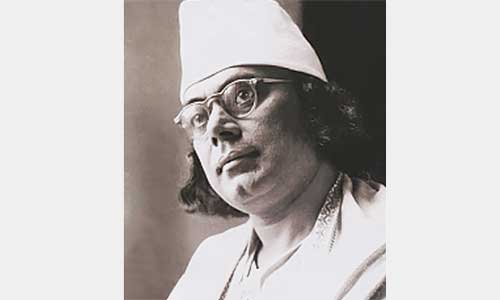Nazrul’s death anniv today
The day’s programme will begin with placing wreaths at the poet’s tomb on Dhaka University Central Mosque premises in the morning.
Different socio-cultural organisations have planned elaborate programmes marking the poet’s death anniversary.
Bangladesh Shilpakala Academy and Nazrul Institute have jointly organised a programme at the academy featuring discussion, Nazrul Padak distribution ceremony and cultural programmes. Bangla Academy observed the day on Wednesday when Nazrul Academy will observe the poet’s death anniversary tomorrow.
On the occasion, president Abdul Hamid, prime minister Sheikh Hasina and Bangladesh Nationalist Party chairperson Khaleda Zia in separate statements conveyed their honour to the poet and prayed for his departed soul.
Bangladesh Betar, Bangladesh Television and private TV channels will air special programmes, highlighting Nazrul’s life and work.
Kazi Nazrul Islam (1899–1976) was not only a brilliant poet, but also a music composer and lyricist of exceptional talent.
In his short artistic career of just 21 years, before be lost his speech, Nazrul penned 3,174 songs, 600 poems, three novels and 43 essays, according to Nazrul Institute.
Hailing from a humble background, Nazrul did not have the privilege of a well-off student.
He led an ordinary but eventful life, but his talent, honed through years of dedication and determination despite continued challenges, triggered him to write poems, songs, novels and plays that stood the test of time. His poems were inspired by themes of love and revolt and a deep compassion for common people.
At nine, he had to join a Churulia-based professional leto troupe to earn his livelihood. While working for the troupe, he was introduced to works of Bangla and Sanskrit literature. A year later, he resumed education and got enrolled into Matharun English School but dropped out from class six for poverty.
This time, he worked with a Kabi Gaan troupe and subsequently took up a job at a bakery shop. At this stage of his life, Nazrul started writing poems and his talent soon grabbed the attention of a police officer named Kazi Rafizullah, who gave him shelter in his house at Trishal in Mymensingh in 1914, and made him enrolled for class seven at the Darirampur School.
Nazrul joined the British Army in 1917 as a soldier. While serving the army, for two years and a half, he was introduced to Persian literature and learned to play different instruments and music following notation.
Also while in the army, his literary practice took a formal shape: his first poem Mukti, first story Bounduler Atmakahini, and a number of other writings such as Byathar Dan and Meher Nigar were published. After the abolishment of the 49 Bengal Regiment by the British Army in 1920, Nazrul wandered around for a while and dedicated himself to writing revolutionary poems, essays and other writings. He started a fortnightly magazine, Dhumketu, in August 1922.
For his political poem Anondomoyeer Agomone, Nazrul was sentenced to a one-year jail term. While in prison, the poet wrote his masterpieces Aji Srishti Sukher Ullase, Abhishap, Jater Namey Bajjati, Bhangar Gaan and Shikal Para Chhal.
In his creative life, Nazrul also worked as a music composer for popular music brand HMV. He acted in a film, Bhokto Dhrubo, for which he also penned, composed and directed the music. Nazrul also worked for another film, Patalpuri (1935), as a music director. He joined the All India Radio Kolkata sometime between 1938 and 1939.
In 1972, an ailing Nazrul was brought with state honours to Bangladesh. He was conferred on Ekushey Padak in 1976.
Nazrul died in Dhaka on August 29, 1976 (the 12th Bhadra of Bangla calendar).
News Courtesy: www.newagebd.net











